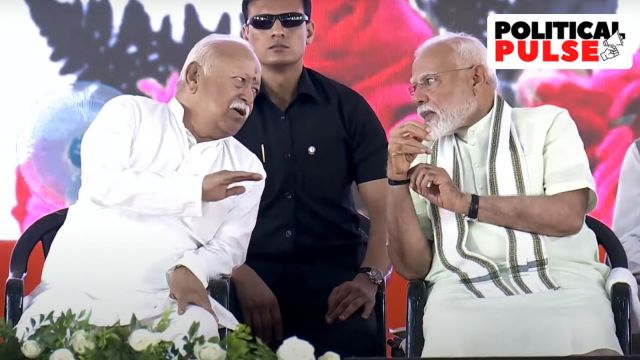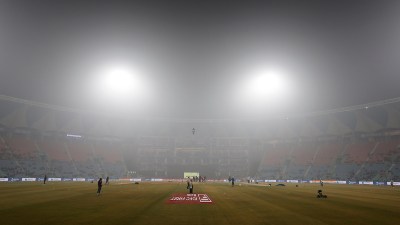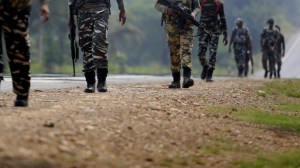Takeaways from PM Modi’s visit to RSS headquarters: What it means for BJP-Sangh ties
Modi paying tributes to Hedgewar and Golwalkar, and emphasising on the Sangh’s role in “Viksit Bharat” plans surprised many RSS functionaries as former BJP PMs and senior leaders chose to make a distinction between their politics and association with RSS
 Prime Minister Narendra Modi with RSS Chief Mohan Bhagwat during the foundation stone laying of 'Madhav Netralaya', in Nagpur. (PTI)
Prime Minister Narendra Modi with RSS Chief Mohan Bhagwat during the foundation stone laying of 'Madhav Netralaya', in Nagpur. (PTI)Prime Minister Narendra Modi’s visit to the RSS headquarters in Nagpur on Sunday – his first since assuming power in 2014 – and his profuse praise for the organisation is being seen as marking a shift in the BJP’s stance towards its ideological parent following “frosty relations” last year.
“The RSS is India’s huge banyan tree of immortal culture and modernisation. Whereas, the lakhs and crores of swayamsevaks are like its stems and branches selflessly serving the country with unwavering dedication and commitment,” Modi said.
Modi’s visit to the Hedgewar Smruti Mandir, a memorial for the first two sarsanghchalaks of the RSS, K B Hedgewar and M S Golwalkar, has pleasantly surprised many even within the Sangh, and is being seen as an attempt of the BJP and RSS to mend fences and put up a united front.
“It is no secret that the RSS is the ideological mentor of the BJP. However, former PMs and senior BJP leaders in the past have exercised caution and ensured a distinction between the government and the Sangh. Even though many leaders have credited the Sangh in shaping their careers, they have made it clear that it did not influence or drive their governance or political agenda,” a senior RSS functionary said.
The PM’s visit also comes nine months after the BJP, for the first time in a decade, saw its Lok Sabha tally dip below the majority mark in last year’s polls amid reports of unease between the party and the Sangh.
Ahead of the Lok Sabha polls, indicating that the BJP was “self-sufficient”, party president J P Nadda had told The Indian Express that the BJP had grown from the time it needed the RSS and is now “saksham” (capable) and runs its own affairs.
Following its Lok Sabha drubbing, the BJP seemingly course-corrected and subsequently registered emphatic victories in Assembly polls in Haryana, Maharashtra and Delhi reportedly after reaching out to the Sangh.
Senior RSS leader Seshadri Chari, however, dismissed speculations over the differences claiming such talks were initiated by “those who did not understand the BJP and Sangh”.
However, poll managers within the BJP admitted that the RSS had “strong reservations” with the party’s institutionalising personality-driven politics as it went into successive elections on the “Moditva plank” as a part of its “post-2014 Modi brand of politics”.
Modi, a former RSS pracharak himself, sharing the stage with RSS chief Mohan Bhagwat first at the Hedgewar Smruti Mandir and later at the Madhav Netralaya Premium Centre also is seen to be indicative of the “narrowing differences” between the BJP and the Sangh. Prior to this, the duo had shared the stage in Ayodhya during the consecration of the Ram Temple in January last year.
Terming the experience of visiting the memorial as “overwhelming”, Modi said, “The memorial of two strong pillars of RSS is an inspiration to lakhs of swayamsevaks who have dedicated themselves to the service of the nation.”
The PM’s Nagpur visit, ahead of two important events – the RSS’ centenary celebrations and the BJP’s National Executive in Bengaluru – is also being viewed as a sign of warming ties between the two organisations, at a time when the BJP is likely to announce its new national president during the Bengaluru meet next month.
Given this backdrop, the PM’s reference to the RSS as an organisation that has “upheld the highest principles of ‘samparpan (dedication)’ and ‘seva (service)’” is also being viewed as the BJP’s efforts not only to identify and acknowledge, but also legitimise the Sangh’s role in its “2047 Viksit Bharat” plans by outlining the Sangh’s “constructive role in nation building and development”.
“The RSS is our ideological mentor. Today, PM Modi reiterated the Sangh’s role in nation building and the country’s development,” Maharashtra BJP chief Chandrashekhar Bawankule said.
Though many Sangh-affiliated organisations work for social causes across the country, they have been viewed with skepticism by opponents and often been accused of “peddling its hidden agenda”. For instance, its push for Ram Temple and abrogation of Article 370 – issues which were backburners in previous NDA regimes to avoid uneasy conversations with allies – had also earned it a tag of being “anti-Muslim”.
Modi crediting swayamsevaks for playing an “important role” in the recent Maha Kumbh Mela at Prayagraj is being perceived as a sign that some of the RSS’ core agendas are returning to the forefront of the BJP’s politics and also comes in the backdrop of the Centre’s decision to lift the ban imposed on government servants from participating in social activities undertaken by the RSS.
- 01
- 02
- 03
- 04
- 05































